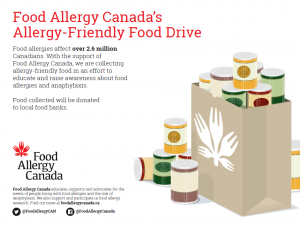
If you are not personally impacted by food allergies, why be aware of them in the first place?
While it’s essential that individuals with food allergies take responsibility for their own safety, there are many things that other community members can do to enhance that safety by meeting these efforts halfway. This is called shared responsibility, and it matters.
Yet, before learning the hows of food allergy awareness, here are five of the core whys of this awareness.
- Food allergies affect someone you know. With 1-in-13 people in Canada living with one or more food allergies, you or someone you know is likely among them. In fact, 1-in-2 Canadian households are impacted by food allergy. These are not nameless faceless individuals; they are our friends, our family members, our co-workers, our students, and teachers. And the more food allergy awareness that exists in society, the safer they will be.
- Children have a higher prevalence. The incidence of food allergy is highest among children under 3 years of age, with around 6-8% being affected by food allergy. As a result, anyone who spends time with young children should be prepared and allergy-aware.
- Promoting inclusion. While individuals with food allergies have more control over their exposure to their allergens in their homes, other homes and public spaces are quite different. And this is where food allergy awareness can go a long way toward creating a sense of inclusion and welcome in venues such as schools, day cares, restaurants and the homes of relatives and friends.
- You can help save lives. By being allergy-aware, you help make life more manageable for those living with food allergy. And in some circumstances, the time you’ve taken to learn more and be ready to respond to a severe allergic reaction can even save lives.
- Make the world a better place. Many of us long for a more caring, compassionate world. We encourage our children to be good neighbours and to take care of the people around them. Being allergy-aware is one way to translate these ideas into action. Not only is this solid modeling of empathy in action for the next generation, but it’s also a way to demonstrate what our communities should ideally be like: Caring environments where everyone has the opportunity to feel included.
How you can become more allergy-aware: Top Tips
- Online learning (this is a must!): Take the free, 30-minute online course, Anaphylaxis in the Community from AllergyAware.ca – where you can learn the basics of anaphylaxis, ways to reduce risks, and the recommended emergency treatment. This interactive course includes videos and quizzes, making it fun and easy to learn.
 Participate in our Allergy-Friendly Food Drive: Collect allergy-friendly food in an effort to raise awareness about food allergy and educate others. Learn more.
Participate in our Allergy-Friendly Food Drive: Collect allergy-friendly food in an effort to raise awareness about food allergy and educate others. Learn more.- Get educated on the priority allergens: People can be allergic to any food, but some allergies are more common than others. Learn which foods are listed as priority allergens by Health Canada, and have specific food labelling requirements.
- Learn how to recognize the signs and symptoms of an allergic reaction.
- Discover the basic science behind food allergy: Watch our recorded webinar on what the basic science is behind food allergy. Dr. Manel Jordana walked us through the research for allergy prevention, allergy therapies, and what could potentially lead to a cure.
 Ask questions: If you are having a party or gathering, ask if anyone has food allergies. If you are hosting someone with a food allergy, ask them in advance about their allergy and what you can do to accommodate. You can talk about the menu, safe food preparation, and any triggers your home may have (like pets or woodsmoke). Read a few tips we share with our community when they are going out to someone’s home. Your empathy and consideration will make a world of difference to your friends with food allergy.
Ask questions: If you are having a party or gathering, ask if anyone has food allergies. If you are hosting someone with a food allergy, ask them in advance about their allergy and what you can do to accommodate. You can talk about the menu, safe food preparation, and any triggers your home may have (like pets or woodsmoke). Read a few tips we share with our community when they are going out to someone’s home. Your empathy and consideration will make a world of difference to your friends with food allergy.- Donate: Consider donating to Food Allergy Canada, your contributions make a significant difference. Learn more!
Check out our About Allergies section to learn more about food allergy. Thank you for supporting your friends and loved ones with food allergy!
Tags: Allergy aware, Support, supporting people with food allergies